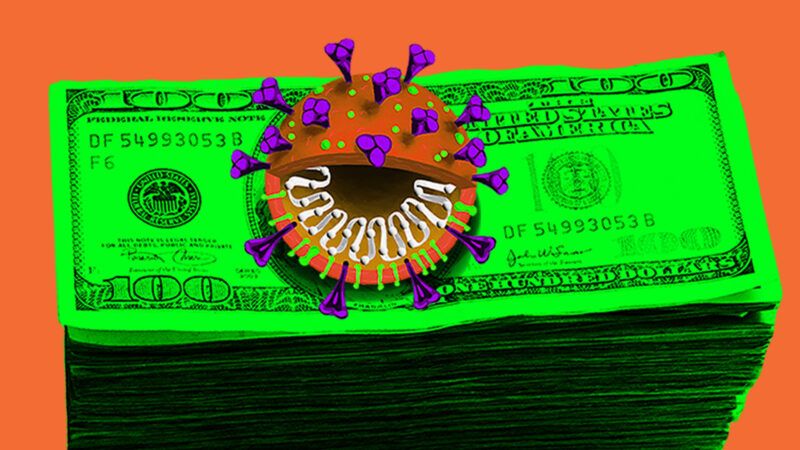More Checks Are Coming After Congress Passes $1.9 Trillion COVID-19 Bill That Has Little To Do With COVID-19
Some provisions provide direct aid. Others, not so much.

Congress on Wednesday passed a $1.9 trillion COVID-19 aid bill, complete with relief checks, school funding, state bailouts, and emergency business loans, among other provisions. While some aspects of the American Rescue Plan are related to the coronavirus, much of the bill is not.
There's a healthy debate to be had about what the government owes the American people: With mandated closures upending livelihoods, it's fair to argue that, in some sense, the public deserves redress. Emergency loans for businesses—restaurants, bars, airlines, music venues, and others—will go to those who demonstrate some sort of economic hit. Single adults making less than $75,000 a year and couples who file jointly and make less than $150,000 will qualify for $1,400 and $2,800 respectively, though there are likely few individuals or families in the upper end of those income brackets who genuinely need that aid.
No such means test will be applied to money headed for state government coffers, yet it perhaps should be. Many states aren't doing poorly at all, with California, for instance, reporting a $15 billion budget surplus. American taxpayers are about to send them several billion dollars more.
The same can be said for school funding. As Reason's Peter Suderman notes, Biden campaigned on speedily reopening schools and quickly backtracked, citing a need for more education funding to ensure proper COVID-19 protocols. The problem is that there remains unspent $100 billion allocated for schools in previous coronavirus relief legislation. The additional billions allotted to schools by the American Rescue Plan also won't be used anytime soon, though it's supposedly necessary to reopen schools in the near future.
"Just $6 billion would be spent in the 2021 fiscal year, which runs through September," writes Suderman. "Another $32 billion would be spent in 2022, and the rest by 2028. Biden is insisting that schools must reopen soon—and also that the only way for them to reopen is to authorize more than $120 billion in spending, most of which wouldn't roll out for years. It doesn't make much sense."
In that vein, the bill is peppered with standard Democratic policies disguised as COVID-19 relief. For example, Congress just approved 15 weeks paid leave for every federal employee who has a child in virtual learning, even if their children are enrolled in districts where schools have reopened and remote learning is merely an option provided to cautious parents. It's evocative of the Democrats' first coronavirus aid bill a full year ago, which attempted to carve out a permanent paid leave program for victims of stalking and domestic violence.
The $15 minimum wage proposal, another policy with no connection to COVID-19, was nuked by the Senate parliamentarian and centrist Democrats. That, too, was packaged as coronavirus aid for struggling workers, notwithstanding the fact that it wouldn't have gone into full effect until 2025.
Funds for a bridge connecting New York to Canada, as well as for a new metro in San Jose, California, were also scrapped from the legislation.
But other unrelated provisions survived to make it into the final bill. As Reason's Eric Boehm reports, the Congressional Budget Office "estimates that a total of $480 million in the bill will be spent on 'miscellaneous' educational matters like 'grants to fund activities related to the arts, humanities, libraries, and museums, and Native American language preservation and maintenance.'"


Show Comments (56)